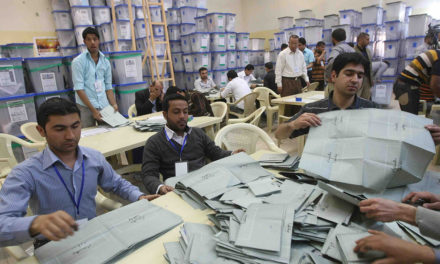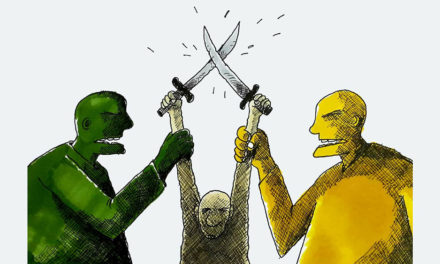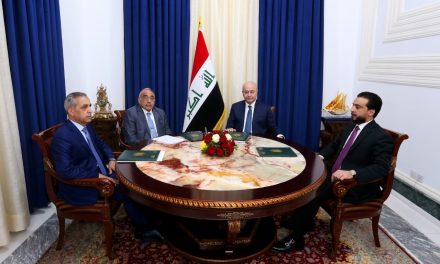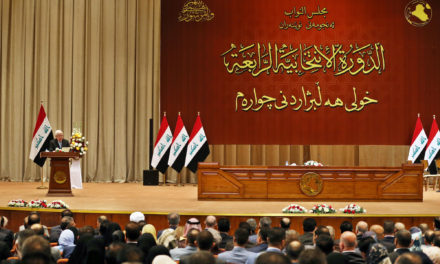On September 3, 2018, I was sworn in as the youngest member of the Iraqi Council of Representatives (parliament), and the first elected official in my family. A few things helped me survive, the most important of which was my background as a journalist. When you are a journalist, you engage with politicians and become familiarised with not only their policies and ideologies but their implicit biases, personal affairs, and acts of corruption. When I entered the parliamentary hall for the first time, I saw sharks standing next to me, pledging an oath to serve Iraq and to protect the interests of its people. Moments later, with the oath forgotten, they returned to their negotiations.
Parliament and most of its members and political caucuses were familiar to me. I admired none of them, but I was interested to see elected officials who rarely attended sessions like Hadi Al-Ameri, Nouri Al-Maliki and Iyad Allawi. These were major figures who shaped Iraq’s politics since 2005 but there was nothing special about them. They had no vision or policies, they just played their cards differently.
After taking the oath in the first session, it was time to elect the speaker and two deputies, but due to disagreements, the session was extended for a few days. Later, a young man, a new face representing Sunni politicians, appeared and outmaneuvered his rival to win the speakership. That man was Mohammed Al-Halbousi. At first, I did not take him seriously. I heard about him from my colleagues and read stories in the media. Many people knew him as an experienced gambler rather than an intelligent politician. Later, he proved both his friends and rivals wrong. He won the speakership in a scandalous scene where MPs took pictures of their votes to prove their loyalty to Halbousi. It was too much for me. I had seen these scenes in political dramas like House of Cards, but to experience it in real life took me back. I saw political rivals dropping out of the race and pledging support for Halbousi, the 37-year-old from Anbar. Halbousi barely made the majority threshold of 165 votes, with only four votes to spare. However, he would later take on his rivals, one by one, and build the strongest alliance among Sunni politicians since 2005, an association chillingly centred around one man.
After Halbousi, the time came to elect the first deputy speaker, Sadr’s political bloc Sairoon appointed former mayor of Sadr City, Hassan Al-Kaabi. In an agreement with Sairoon, the Fateh Alliance withdrew their candidate, and Al-Kaabi won with over 200 votes.
As a Kurd, choosing the second deputy was the most interesting one to me. The moment came to test my negotiation and confrontational skills with my most prominent opponent, the Kurdistan Democratic Party (KDP). Since 2005, the major positions allocated to Kurdish politicians in Baghdad have been divided between the KDP and the Patriotic Union of Kurdistan (PUK). I came to Baghdad to challenge the status quo. In the beginning, the Kurdish opposition MPs were divided, but I worked hard to unite them, and when we were united, we were effective. I was with New Generation Bloc. We did not have a candidate for the second deputy speaker, but we wanted to challenge the KDP. We wanted to tell the KDP that they were not the only ones in Baghdad who represented the people of the Kurdistan Region.
The Kurdistan Islamic Group’s Ahmad Al-Haj announced his candidacy. At first, KDP did not take Al-Haj’s candidacy seriously. I started working with other MPs to collect votes for Al-Haj. I talked to over 70 MPs. The goal was not to necessarily have our candidate win, as we knew it was impossible, but we wanted to prevent the KDP’s candidate from securing 165 votes. We were successful in doing that in the first round. Then the drama started. Masoud Barzani threatened his allies that he would boycott everything. As a result, Fateh Alliance leader Hadi Al-Ameri came to parliament to convince Al-Haj to withdraw; he even used threatening language. Some MPs told Ameri that the two MPs behind Al-Haj’s campaign were Yusra Rajab and myself. Ameri came to me and said, “Please withdraw your candidate; let’s end this, as I promised Kak Masoud this position…. don’t destroy everything. Kak Masoud is your brother.” I was trying to be polite but frank and said, “He (Masoud Barzani) speaks Kurdish, but he is not my brother; you might be my brother and friend if we work together.” Ameri was shocked and replied, “You really are a New Generation.”
The KDP’s candidate Bashir Al-Haddad failed to secure 165 votes. With the second round came more pressure and threats against our candidate. I knew challenging Barzani would be difficult, but I was not expecting the least powerful position amongst the parliament’s leadership to bring the entrenched political parties together in such a manner. Ahmad Al-Haj received dozens of threatening messages from Iraqi and non-Iraqi politicians, asking him to withdraw his candidacy for the second deputy speaker. He refused, and the session was postponed again. The next day, Barzani urged Sunni MPs to help his candidate. Dozens of Sunni MPs flew from Amman to Baghdad to help Barzani’s candidate win. In the end, Bashir Al-Haddad was chosen as the second deputy speaker and the KDP would also take two senior ministry positions, while the PUK would secure the presidency once again, alongside their ministries.
The first session shaped the entire term; a divided parliament, rising tensions among political parties of each component, chaos, and dysfunctional leadership. It is not surprising that our parliamentary term was regarded as the least productive in terms of passing new bills.
Despite all these challenges, I encourage young Iraqis to participate and form new parties and run for office. Having new blood and educated MPs in the Council of Representatives matters. I encourage everyone to take politics seriously and to not leave it to the bad apples of society to govern us. Form alliances, build relations, participate in workshops, educate yourself about politics, and work with MPs voluntarily to learn. It is an honor to represent your people in the highest elected legislature. It is risky and challenging, but it is an important job. It is a bad idea to ignore politics because if good and educated Iraqis abandon politics, we are destined to be ruled by political cartels and the corrupt.
It is hard to make a difference when hundreds of incompetent and corrupt MPs surround you, but it is possible to be different without sacrificing your integrity. You might face many challenges and threats. You may be excluded from important committee leadership positions if you are different and do not agree with the political sharks. But you can be the voice of those who do not have one. You can use parliament’s podium and the power it wields to hold officials accountable, investigate them, and speak out in sessions. There is a lot you can do in parliament without compromising your values.

Sarkawt Shamsulddin
Sarkawt Shamsulddin is a former member of the Iraqi Council of Representatives (2018-2021). He was a cofounder of the New Generation Movement. Previously, Sarkawt worked as the Washington Bureau Chief for NRT TV. He also worked with the U.S. Embassy in Baghdad as a political advisor and holds a master’s in public policy from Virginia Tech university.










